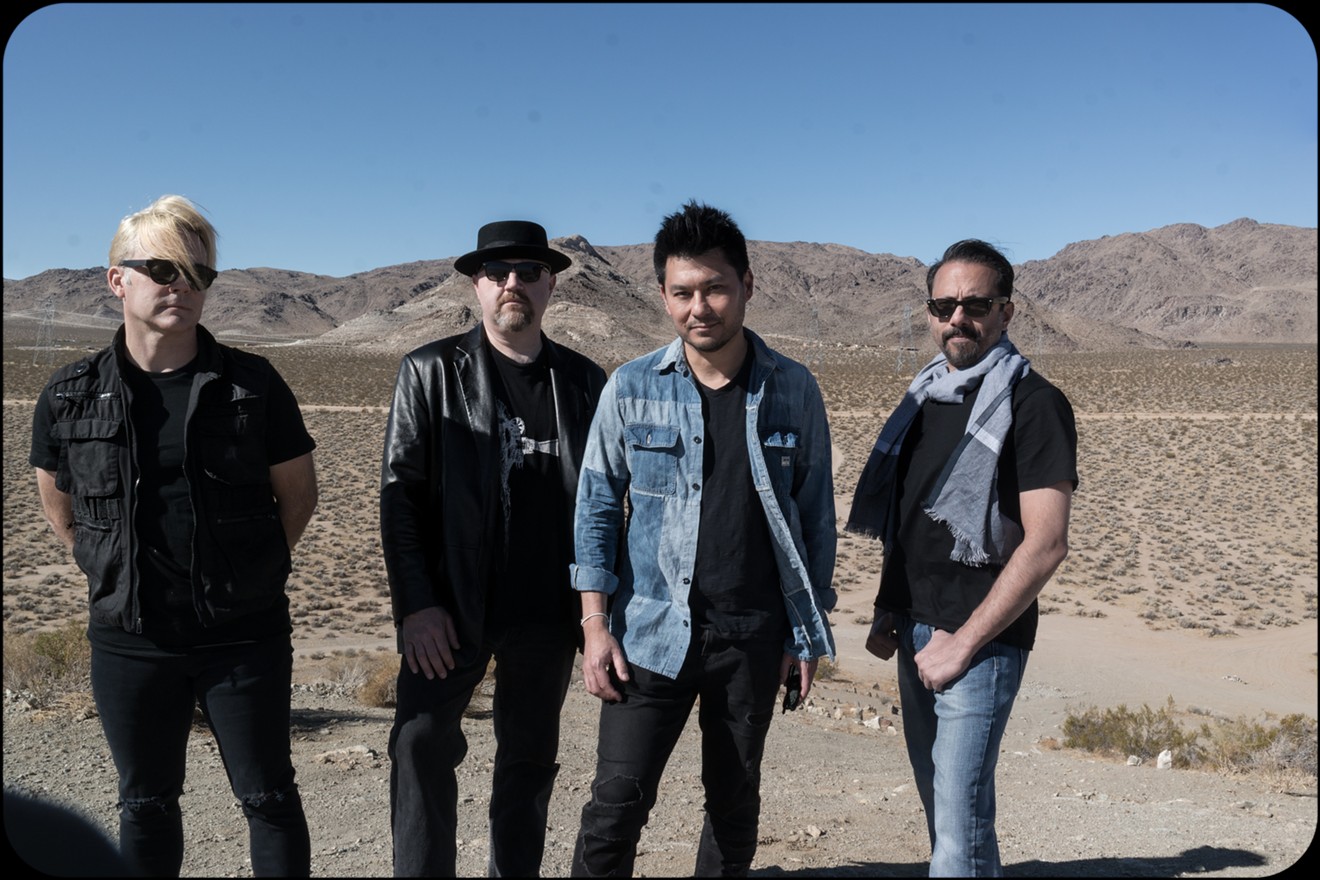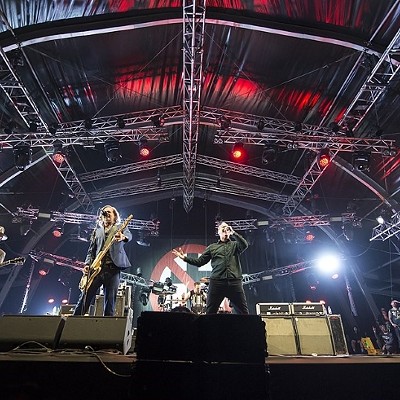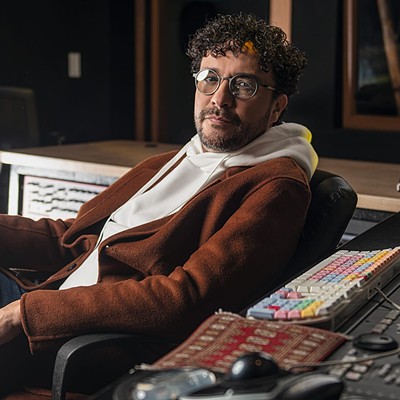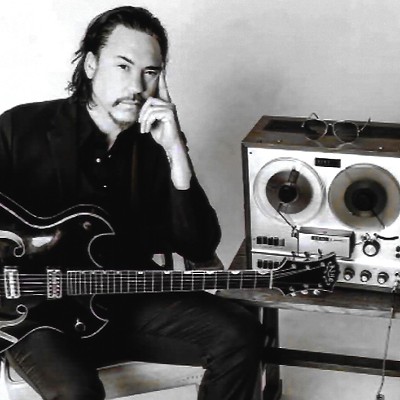The plot line of middle aged men “trying to get the band back together” from their youth has been mined—usually for comedic purposes—by plenty of novels and movies. But the reunited four members of The Jenny Thing are plenty serious about reestablishing themselves in 2021.
To that end, the ‘90s-born California group from the San Francisco Bay-area have released American Canyon, their first new album of original material in 22 years. The record’s eight tracks are drenched in new wave synths, often ghostly vocals, and some deep lyrical themes.
“We definitely did not have that moment of ‘We’ve got to bring this thing back out and take over the world!’ That would be kind of embarrassing,” singer/guitarist Matt Easton laughs. “I’ve been writing throughout the years, but not always bringing it to full completion. I’ve got kids and am married and the whole adult package. But once we decided to go for it, we knew it would work.”
The four original members of the Jenny Thing—Easton, Shyam Rao (guitar), Mike Phillips (drums), and Ehren Becker (bass)—originally came together on the Berkeley campus at the University of California in 1991. Easton and Rao had become fast friends, and began writing songs together while playing them around dorms and campus houses.
The rest of the decade saw the group touring up and down the Golden State at clubs, colleges, and L.A. landmarks like The Roxy and the Troubadour. They even made it through one round of Star Search (that’s pre-American Idol/The Voice/America’s Got Talent, kiddies). Along the way they released three albums: Me, Closer and Closer, and Nowhere Near You.
But as the 21st century dawned, the band split for separate lives, families, and jobs in and out of music. Then five years ago with all members having re-relocated to California, Easton and Rao began collaborating again. Members came in and out of the studio, and American Canyon was put down.
And while their music was very reminiscent of ‘80s/‘90s New Wave stalwarts like New Order, the Cure, and the Smiths, the listeners American Canyon will also hear tinges of Dave Wakeling (English Beat, General Public), the Pet Shop Boys, and Elvis Costello (“I’ve heard that,” Easton says of Costello. “I joke that we have the same sinuses!”).
“I think we reached further back than when we first started on this record, more the kind of stuff we were listening to in junior high in the early ‘80s with O.M.D., Tears for Fears, and the Thompson Twins,” Easton continues. “It’s definitely more electronic. Simpler in some ways and less textural. There’s more space on it.”
But Easton knows there’s a fine line between being inspired by a sound or other acts and aping them. “I think it was Ernest Hemingway who said ‘Write drunk, edit sober. (Note: he didn’t), or it’s just attributed to him. But it’s a great quote,” Easton says.
“I don’t care about sounding too much like anything. One, you just don’t want to be that self-confident when writing. But over time, I feel I’ve developed enough of what I sound like, I can’t help it. If you put enough passion into it along with being inspired, you come out with your own identity."
Loss and challenges of life and love are themes in tracks like “Paper Angel,” “All in My Head,” and “More All the Time.” But it’s the sort of mini-opera of “American Canyon”/“Aeromedica”/“Lightfield” that is the albums centerpiece and most ambitious undertaking. Easton calls the writing more conceptual and connective that the previous records.
The record’s story is loosely based around the theme of a military battle where the main commander character is soundly defeated, his army destroyed, and it changes his life for the worse. He’s rescued by a drunk ambulance driver with a bizarre escape plan (a nod, Easton says, to Hemingway’s novel A Farewell to Arms) who may or may not be trustworthy. But nevertheless, the driver drags him kicking and screaming into a new light for new life and new hope.
The entire record was recorded in Easton’s home, but he did not tell the band they were going to record the mostly spoken-word “Aeromedica” until they got there and had ordered dinner. “I cast them in the roles, and Ehren has a great voice, so he became the main character!” Easton says. “I like to think that it’s a stealth concept record, but each song can carry itself. My friend said it was like prog rock, but only if you listen to more than one song. Otherwise, it’s pop!”
He adds that he was inspired to part by the writings of author Chris Hedges, and specifically his 2002 book War Is a Force That Gives Us Meaning.
“He’s kind of fringy. He’s not too, too crazy, but he’s got some specific positions he takes on Wall Street and Main Street. He’s sort of an anarchist and was an embedded journalist in Afghanistan and Iraq,” Easton says. “[The book] is not pro-war, but it’s about what people are really like when they go to war and derive from it and even what they like about it. And that’s kind of taboo, but really interesting.”
He then goes deeper into philosophies about life and concepts, and even the meaning and imagery behind some of the album’s artwork and video, before catching himself. “Lucky you—you get me on the phone!” He laughs. "I can get kind of meticulous about this stuff.”
On an easier note, Easton says The Jenny Thing is back on track, and already planning their next album. There's possible work with soundtracks and scoring. And he’s also got a side gig as an electronic duo with Rao. They’ve already submitted something for an NPR Tiny Desk contest.
“That music is very human, but it’s also interacting with a computer and analog synth that’s kind of doing it’s own thing,” he sums up. “Overall, with [The Jenny Thing's reunion], we’ve had a lot of great interactions with people. It’s been very energizing.”
Support Us
Houston's independent source of
local news and culture
account
- Welcome,
Insider - Login
- My Account
- My Newsletters
- Contribute
- Contact Us
- Sign out
The Jenny Thing: Uniting an '80s Sound and '90s History with Today's Worldview
Bob Ruggiero July 1, 2021 4:00AM

The Jenny Thing is: Mike Phillips, Ehren Becker, Matt Easton, and Shyam Rao.
Photo by Olivier Riquelme/Courtesy of Hello Wendy PR
[
{
"name": "Related Stories / Support Us Combo",
"component": "11591218",
"insertPoint": "4",
"requiredCountToDisplay": "4"
},{
"name": "Air - Billboard - Inline Content",
"component": "11591214",
"insertPoint": "2/3",
"requiredCountToDisplay": "7"
},{
"name": "R1 - Beta - Mobile Only",
"component": "12287027",
"insertPoint": "8",
"requiredCountToDisplay": "8"
},{
"name": "Air - MediumRectangle - Inline Content - Mobile Display Size 2",
"component": "11591215",
"insertPoint": "12",
"requiredCountToDisplay": "12"
},{
"name": "Air - MediumRectangle - Inline Content - Mobile Display Size 2",
"component": "11591215",
"insertPoint": "4th",
"startingPoint": "16",
"requiredCountToDisplay": "12"
}
]
KEEP THE HOUSTON PRESS FREE...
Since we started the Houston Press, it has been defined as the free, independent voice of Houston, and we'd like to keep it that way. With local media under siege, it's more important than ever for us to rally support behind funding our local journalism. You can help by participating in our "I Support" program, allowing us to keep offering readers access to our incisive coverage of local news, food and culture with no paywalls.
Bob Ruggiero has been writing about music, books, visual arts and entertainment for the Houston Press since 1997, with an emphasis on classic rock. He used to have an incredible and luxurious mullet in college as well. He is the author of the band biography Slippin’ Out of Darkness: The Story of WAR.
Contact:
Bob Ruggiero
Trending Music
- Country Rock Thrives with Gene Clark and Flying Burrito Brothers for Record Store Day
- Bruce Robison Is The Eternal Song Hunter
- Top 10 Butt-Rock Bands of All Time
-
Sponsored Content From: [%sponsoredBy%]
[%title%]

Don't Miss Out
SIGN UP for the latest
Music
news, free stuff and more!
Become a member to support the independent voice of Houston
and help keep the future of the Houston Press FREE
Use of this website constitutes acceptance of our
terms of use,
our cookies policy, and our
privacy policy
The Houston Press may earn a portion of sales from products & services purchased through links on our site from our
affiliate partners.
©2024
Houston Press, LP. All rights reserved.






